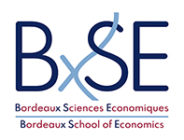Séminaire doctorants
Bordeaux School of Economics
Felix Garnier
Rethinking economic policy with Ubuntu
South Africa’s post-apartheid mining sector embodies a systematic contradiction between extractive neoliberal economics and Ubuntu relational ethics (umuntu ngumuntu ngabantu – « a person is a person through other persons »). This paper develops an Ubuntu-EPACE analytical framework that applies Ubuntu principles to economic metabolism—the stages of Extraction, Production, Allocation, Consumption, and Excretion. Through philosophical analysis combined with empirical examination of South African mining, the framework reveals how extractive capitalism violates relational ethics at every metabolic stage: denying communal consent in extraction, commodifying labor in production, enabling elite capture in allocation, creating consumption inequality, and generating toxic legacies in excretion. The paper then proposes institutional mechanisms for Ubuntu-aligned economic governance, including mandatory Free Prior and Informed Consent, community co-ownership structures, and circular economy requirements that operationalize the maxim feta kgomo o tshware motho (« choose life over possessions »). This contributes both an analytical tool for critiquing extractive capitalism and concrete pathways for post-development alternatives grounded in African philosophical traditions.
Agenda > Tous les événements



